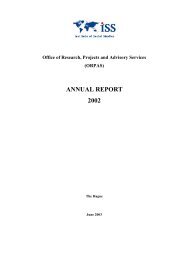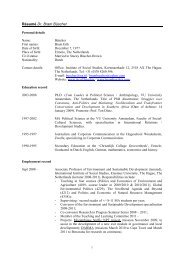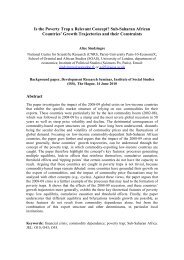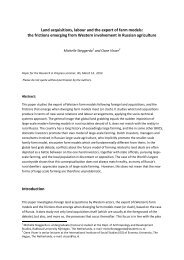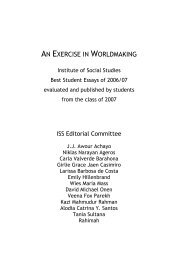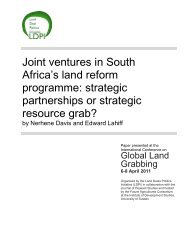AN EXERCISE IN WORLDMAKING 2009 - ISS
AN EXERCISE IN WORLDMAKING 2009 - ISS
AN EXERCISE IN WORLDMAKING 2009 - ISS
You also want an ePaper? Increase the reach of your titles
YUMPU automatically turns print PDFs into web optimized ePapers that Google loves.
10 Understanding Informality In A Colombian Context 115<br />
scious acts to defend the status quo and respond to the privileged interest<br />
groups or state dependence on the informal sector to supply goods<br />
and services the state cannot or will not” (Rakowski, 1994:41). In other<br />
words, the Legalist school recognizes that the government is a central<br />
entity that blocks the entry to formality either consciously or out of neglect<br />
in order to maintain its monopoly position, and thus by instituting<br />
bureaucratic mazes, stunt the opportunities of small or informal producers.<br />
Current Notions of Informality<br />
Linkages have remained central to the current understanding of informality.<br />
Both the nature of enterprise and the status of employment form the basic<br />
units of analysis, thus covering all economic activities. The lack of<br />
formal arrangements in either category is what particularly thwarts access<br />
to the institutions necessary to fortify either the enterprise or the labor<br />
relationship that affords security and growth. As such, discourse has<br />
largely shifted towards issues of access, to capital, infrastructure or benefits.<br />
From this notion of access, the Micro-enterprise development approach<br />
has been adopted both by state agencies and non-governmental<br />
organizations who perceive potential benefits of stimulating local economic<br />
development. Intervention is seen as a practical means to ensure<br />
that formalizing status and relationships allow individuals and enterprises<br />
to pay contributions to the state. The state in turn would develop the<br />
capacity to provide more physical capital and social benefits to the overall<br />
working population and their dependents. This point is particularly<br />
important as with the exception of welfare states, legislation in many<br />
countries “make social security dependent on employment rather than a<br />
universal citizen right” (de Oliveira and Roberts, 1994: 57-58). In other<br />
words, those who participate in the informal economy are shunned from<br />
accessing these basic measures of social security, unless the state decides<br />
to expand the scope of inclusion of its social policies.<br />
Given the centrality of the state, either defined as a principle cause,<br />
contributor, intervener or solution provider for the local informal economy,<br />
it is important to draw the processes of state formation and development<br />
to be able to understand the domestic interpretation of the informal<br />
economy and its required interventions.




